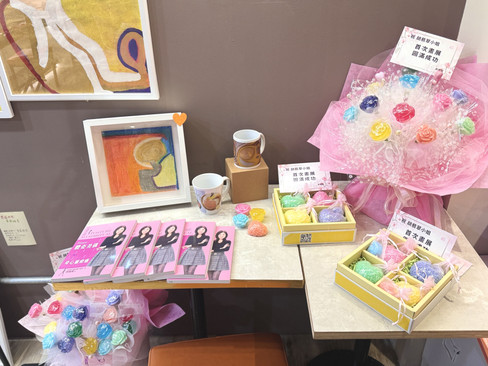New Open/ 翡藝所思 翠舞純菁 圖x文|姚 采穎
Art reveals the profound and diverse movements of the human soul. What we experience in art is not simply or singularly emotional in nature, but rather the dynamic process of life itself, oscillating between many opposing poles, including joy and sorrow, hope and fear, ecstasy and despair.
Painting infuses life with elegance and spirituality.

On the tranquil afternoon of the Spring Equinox, the serenity is picturesque, with birdsong ringing clear in the air, imbuing the corner of Shi-da with a cultural atmosphere. Strolling amidst the greenery, heading towards a hidden urban café, the warm sunlight filters through the glass, casting a glow upon the artwork "Sweet Dew Balls", adorning the walls of textured iron-grey concrete. Hu Feicui, utilizing painting as therapy, emerges from a low point. The playful, innocent, vibrant colors, and imaginative paintings embark on a journey of mindfulness and spirituality.

Artist Hu Feicui defines her artwork as "Zero Frame Painting" or "Spirit Frame Painting," indicating that the works are completely without frames, unrestricted, and free from any constraints. Traditional framing imposes fixed forms, making paintings cumbersome and difficult to transport. She advocates for the integration of art into everyday life, allowing for spontaneous creation and free interchangeability. Thus, she began experimenting with frameless designs, using bumper strips to protect the edges. Through her ingenious design, the artwork is endowed with a new appearance, expressing the concepts of freedom and infinite possibilities.
The Buddha's teachings are a way of life.

During her stay in Shanghai, she experienced a fragile state of mind and body. After returning to Taiwan, by a stroke of luck, she met the Vajra Guru of Tibetan Buddhism, "Khenpo Songba Renboche," and after taking refuge, the Guru named her "White Tara." Religion provided her with greater strength. She used painting to dispel negative emotions, enhance positive energy, and developed a unique artistic style.
The centerpiece of this exhibition, "Treasure of the Shop" - Amrita Pills, is her most significant work where she channeled powerful intentions, listening attentively to the Guru reciting the Heart Sutra throughout, expressing the energy in an artistic manner. She believes that the practice of Buddhism is not just about reading scriptures and understanding principles but also about implementing these teachings in everyday life. Practical action is more important than understanding Buddhist doctrine.
"As Confucius said, 'Every day, I examine myself three times,'" Hu Feicui remarked. Regularly reflecting on one's actions, whether good or bad, consciously engaging in introspection and evaluation, and putting Buddhist teachings into practice in daily life are essential. "Don't be a person who drifts with the tide but stand firm and lead a solid life."
Immersed in a beautiful mood, like a bird freely soaring in the sky. Full of vitality in her creations, one can feel her passion and energy. Her works bear a subtle elegance, quietly reminding a corner of consciousness. Despite facing various challenges in life, she maintains a positive and optimistic attitude, gracefully embracing the acceptance of life. This tranquility, like a bird soaring freely in the sky, gently brushing the bright spring scenery with a light breeze, feels liberated. And those experiences traversed, life savored. Through artistic creation, she spreads positive energy, making Hu Feicui even more beautiful and wise.
).png)



